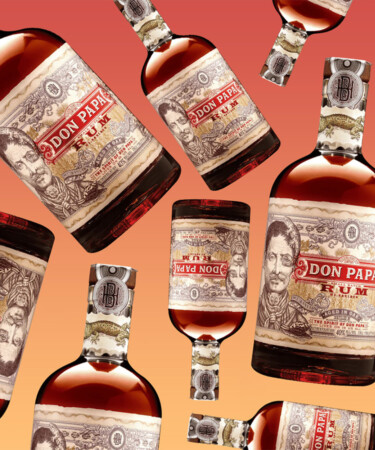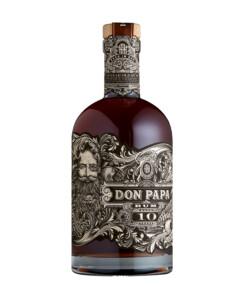Established in 2012, Don Papa Rum is a relative newcomer in the spirits space. But in its decade on the market, it has already made its mark as a premium rum. The brand, founded by Stephen Carroll and Andrew John Carcia, proudly embraces its home in the Philippines by highlighting the history and majesty of the region in the rum’s label, story, and bold flavors.
Don Papa has also recently garnered some serious attention with its rapid growth across the globe, which led to its recent acquisition by a major player in the spirits industry. While it continues to expand, Don Papa Rum has remained true to its Filipino heritage by adopting partnerships and programs to support local artists, farmers, and conservation efforts. Read on to learn how Don Papa Rum celebrates the spirit of the Philippines with its flavors, contributes to the local community, and gets creative with secrets hidden in their labels.
The company was inspired by a trip to the Philippines.
Carroll told Forbes that he visited the island of Negros Occidental in the Philippines in the early 2000s and was immediately taken by its beauty, and that he became intrigued by the idea of a place that offers everything from the world’s finest sugar cane to stunning beaches and mountains. Carroll believed that great Filipino rum could be made from ingredients grown on the island, and about 10 years later, he partnered with co-founder Andrew John Garcia to launch Don Papa Rum, distilled from Negros sugar cane harvested at the base of an active volcano.
Don Papa rum is made in “Sugarlandia.”
Negros Occidental is commonly known as the sugar bowl of the Philippines and is fondly called Sugarlandia, as it produces most of the country’s sugar supply. So while Sugarlandia is indeed a real place Don Papa takes pride in, the brand also took some creative license with its history and added some fantastical lore to its brand story. You can watch a video on its website to dive deep into Don Papa’s world of Sugarlandia, which combines both facts and myths about the wondrous island.
It was recently acquired by Diageo.
In January 2023, Diageo announced that it was set to acquire Don Papa Rum for $280 million. The brand “has gone from strength to strength since its launch in 2012, consistently outperforming the market in Europe. It is currently available in 30 countries, with France, Germany and Italy being its largest markets,” the company said in its announcement of the deal. Diageo says it will work with co-founder Stephen Carroll to continue to drive the expansion of the brand in an exciting category.
Don Papa’s name is based on a local hero.
The name Don Papa is a reference to activist Dionisio Magbuelas, who was also known as Papa Isio, as a tribute to his leadership in the Philippine revolution. Papa Isio was widely regarded as a local hero for his role in driving the Spanish away from the island of Negros in 1898, so his image felt like the perfect fit for the brand to convey the spirit of the island on the label.
It is considered the country’s first sipping rum.
The flagship bottling of Don Papa Rum is made from a local sugar cane strain grown on the volcanic soils of Mount Kanlaon. This is used to make rich, “black gold” molasses, which is then distilled and aged in American oak barrels for over seven years before bottling, giving it an intense caramel and vanilla flavor. The liquid’s distinct sweetness and rich flavors distinguish it as the country’s first sipping rum. While Don Papa offers a series of cocktail recipes that are great to showcase its characteristics, such as the Don Old Fashioned and Papa Negroni, this rum is greatly enjoyable neat or on the rocks.
If you look closely, you’ll see hidden animals on the label.
Don Papa’s original label was designed by New York design company Stranger & Stranger to capture the history of Negros Occidental, including Don Papa (based on Papa Isio) and the many native creatures found in the jungles. The label supposedly has 50 animals hidden within the design, including a cheeky tarsier, a small primate endemic to several southern Philippine islands. Notice the monocle on Don Papa’s eye? That’s actually a gecko.
The image of Don Papa reflects the age of the rum.
The brand recently released a new premium bottling, Don Papa 10, which is aged for 10 years in re-charred American oak barrels. The aged rum is darker and bolder, offering flavors of dried fruits, cacao, and vanilla. To highlight the maturation of this rum, the image of the man on the label now has a longer beard to signify the extended aging.
Some of Don Papa’s label designs come from an art competition.
Soon after Don Papa’s launch, it was recognized by the design industry for its striking labels. The brand’s connection to the art community inspired it to launch a design competition in 2015 in association with Art Fair Philippines to celebrate local artists. The winning artwork was used to make special canister packaging sold around the world. In addition to their art being introduced to audiences outside the Philippines, the winning artists were awarded with trips to key artistic capitals around the world including Paris, Florence, New York, and London. (You can explore the art from previous winners on their website.) After discontinuing the art competition in 2020, Don Papa has shifted toward giving back to artists directly by supporting the ArtFairPH residency programs.
It’s a supermarket staple in France.
Nutella biscuits, Herta Bio charcuterie, and Don Papa Masskara botanical rum. What do all of these items have in common? They were all included on the list of the top 10 most successful product launches in French grocery stores in 2018. This is a testament to how popular the Don Papa brand has become in European markets.
Don Papa is passionate about conservation.
Negros Occidental is home to a wide range of majestic plants and animals, and as Don Papa Rum is located in the center of it all, the brand has become passionate about conserving the land. To help in this effort, Don Papa has partnered with the Talarak Foundation and the Philippine Reef and Rainforest Conservation Foundation to support their conservation initiatives. Don Papa also works with local farmers who practice responsible agriculture to sustainably produce its rum.

